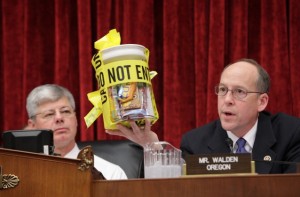How Tainted Food Slips Through The Cracks In Our Food Safety System

More than two weeks into the nation’s first criminal trial stemming from a nationwide outbreak of a foodborne illness, jurors learned that U.S. food safety often relies on the words of manufacturers rather than actual federal oversight.
Stewart Parnell, Michael Parnell, and Mary Wilkerson — president, food broker, and quality assurance manager of the now-defunct Peanut Corporation of America (PCA), respectively — currently stand trial for their part in the national salmonella outbreak in 2009. That incident caused more than 700 illnesses in 46 states, more than half of whom were among children, and spawned the largest food recall in U.S. history. A 2010 federal investigation traced the tainted peanut products to PCA factories in Blakely, Georgia, Suffolk, Virginia and Plainview, Texas.
Last week, witnesses in the Georgia food safety trial recounted instances when the defendants knowingly shipped salmonella-tainted products around the country and sent customers test results from clean batches, under the FDA’s radar. Defense attorneys in the case against the peanut processing company pointed out that federal laws still do not require salmonella testing.
“The defense’s argument that the FDA did not require testing is weak when PCA defrauded customers and shipped a product that they knew could kill people,” Jaydee Hanson, senior policy analyst at Center for Food Safety, told ThinkProgress. “They’re not being charged with manslaughter, but these managers of the PCA plant have killed more people in their negligence than most mass murderers.”
The 2009 outbreak counts among similar events that have taken place across the country, including an E.coli outbreak that same year that caused a nationwide recall of more than 248,000 pounds of beef. In 2012, federal officials linked an outbreak of Salmonella Typhimurium to ground beef produced in Michigan. Most recently, reports arose out of two states about eight illnesses and one death from dairy products contaminated with strains of Listeria monocytogenes.
Experts say that federal regulators share some blame in the outbreak of foodborne illnessesin recent years because of outdated food standards and influence by corporate interests. This is widespread problem in the food policy sector. For decades, critics have lashed out against the FDA for allowing the use of bovine growth hormones and antibiotics in dairy cows, despite research that such hormones induce the growth of tumors. In 2005, Dr. David J. Graham, associate director of the FDA’s Office on Drug Safety, also alleged that the federal agency often advances the interests of pharmaceutical companies instead of American consumers.
The federal government has recently made some improvements in this area. This month, the U.S. Department of Agriculture (USDA) drafted new regulations that would require stores to trace where beef products originated, with details including the date and time ground beef was produced the grinding equipment used. The recent proposals come nearly three years after President Obama signed the Food Safety Modernization Act – legislation that broadened the FDA’s authoritative powers over food harvest and production — into law.
While many critics said that much of the responsibility still falls on foreign producers of imports, which account for 15 percent of U.S. food consumption, some people, including Hanson, tout the bill as a means of holding companies accountable and preventing future domestic public health disasters. The law seems to have come just in time: The Centers for Disease Control and Prevention predict that challenges to food safety will increase due in part to changes in food production and supply, environmental changes, and new and emerging germs, toxins, and antibiotic resistance.
“The FDA could shut down a facility if they think its products cause illness or death,” said Hanson. “It used that authority in 2012 when they suspended a company named Sunland, using data that showed that the company’s products caused 42 illnesses.”
Source(s):
http://www.healthfreedoms.org/how-tainted-food-slips-through-the-cracks-in-our-food-safety-system/